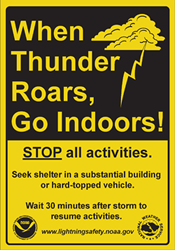 Alabama Gov. Robert Bentley declared Feb. 19-24 as Severe Weather Awareness Week to encourage people to make their own personal preparations long before severe weather strikes. On average each year in the US there are 10,000 severe thunderstorms, 5,000 floods, 1,000 tornadoes, and an average of 2 hurricanes making landfall. “The key is readiness,” Governor Bentley said. “When storms strike, it’s too late to prepare. Let’s prepare now.” Yesterday was dedicated to Severe Thunderstorms, while today is dedicated to Lightning which will be followed up by Tornados, Flooding, and Weather Radios.
Alabama Gov. Robert Bentley declared Feb. 19-24 as Severe Weather Awareness Week to encourage people to make their own personal preparations long before severe weather strikes. On average each year in the US there are 10,000 severe thunderstorms, 5,000 floods, 1,000 tornadoes, and an average of 2 hurricanes making landfall. “The key is readiness,” Governor Bentley said. “When storms strike, it’s too late to prepare. Let’s prepare now.” Yesterday was dedicated to Severe Thunderstorms, while today is dedicated to Lightning which will be followed up by Tornados, Flooding, and Weather Radios.
When Thunder Roars, Go Indoors
While this is a pretty simple message, it still is some good advice, even if the sky is clear where you are at. Some “bolts from the blue” have been known to strike up to 15 miles away from the actual storm. Most strikes generally occur where the storm is at currently (60- 70%), with the remainder extending out 3 miles from it, which is why the sign above cautions one not to venture out for another 30 minutes.
General Reminders:
- NO PLACE outside is safe when thunderstorms are in the area
- If you can hear thunder, then lightning is close enough to strike you so move to a safe shelter.
- Safe shelter is generally considered a substantial building or inside a vehicle (metal-topped not convertible, fiberglass, or glass topped)
- Once the storm & thunder has passed you should stay put for at least 30 minutes
Indoor Lightning Safety Tips:
- While many say this is a myth, I have seen the effects of lightning damage to homes so I would recommend staying off corded phones, computers and other electrical equipment that may put you in direct contact with electricity.
- Avoid plumbing, including sinks, baths, and faucets if plumbed with copper, cast iron, etc…
- While beautiful to look at you should stay away from windows, doors, and off of porches, decks, etc…
- While your house is a shelter it can still be hit so you shouldn’t lay on concrete floors, or lean against the walls.
- Consider installing a whole house surge arrest which should help protect your electronics. Even with one of those, about once a year we will get one of those storms where I will still unplug some of our electronics.
Outdoor Risk Reduction:
- If possible, you need to get off elevated areas such as hills, mountain ridges or peaks
- Do you remember that ball shaped posture one should take during a thunderstorm, it isn’t all about protecting your head, but rather minimizing your size and minimizing the ground contact differences.
- Speaking of ground contact, do not stand with your feet far apart, but keep them close together & whatever you do not lay out on the ground. Along those lines, don’t bunch up as group but spread out and don’t be holding hands. If you must comfort your wife or a kid, stand as close together as possible.
- Trees never make for good cover, neither does a cliff or overhang – it might help keep you dry but is more likely to get hit
- Immediately get out and away from ponds, lakes and other bodies of water and stay away from objects that conduct electricity (fences, power lines, windmills, etc.)
If someone is struck by lightning:
As mentioned in the video above; contrary to certain urban myths, said individual does not carry an electrical charge and will probably need immediate medical attention. Not only did they have a ton of voltage flowing through them, but the heat from that electricity can be intense. Make sure you monitor their condition, and perform first aid as needed. It would also be wise to call 911 even if they say they are fine and get immediate medical attention.
More Information & Websites:
- NWS: Lightning Safety Home Page
- NWS: Lightning Safety Myths & Truths
- Madison County Lightning Tips
- NOAA: Lightning safety on the job (pdf)

Great insights. I
loved to read your article. You must be putting a lot of time into your blog!
Great insights. I
loved to read your article. You must be putting a lot of time into your blog!